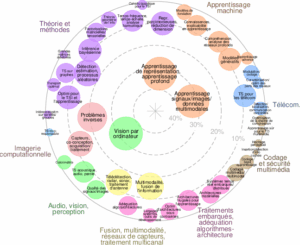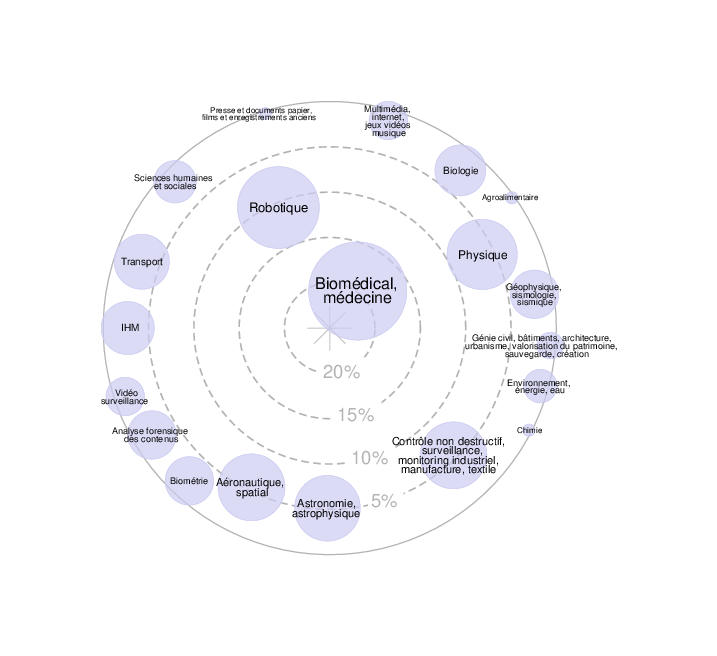Duration: 6 months
Start date: From February or March 2026
Level: Master’s degree (M2 or equivalent) in Applied Mathematics, Computer Science
Allowance: According to current French regulations (approximately €630/month)
Location: LITIS, University of Rouen Normandy, Rouen, France
Keywords: Federated Learning, Source-Free Domain Adaptation, Class Imbalance, Unsupervised Learning
Context
Federated learning (FL) enables models to learn from distributed datasets across diverse clients (e.g., edge devices, hospitals, or industrial sites) while maintaining privacy [1]. A major challenge in supervised FL is statistical variability, which causes client distribution shifts—differences in data distributions across clients [2]. Additionally, many clients contain unlabeled data that remain unused due to annotation costs, inconsistent labeling protocols, and model updates. As a result, FL with unlabeled data has gained attention, with approaches that take advantage of clustering techniques to correct client shifts [3,4].
Since domain shifts in Domain Adaptation (DA) are analogous to client shifts in federated learning, federated domain adaptation has naturally emerged to transfer methodological advances from DA to address distribution shifts [5]. DA seeks to learn a domain-invariant feature space between labeled source and target domains, whereas unsupervised domain adaptation handles the more challenging case where target data are unlabeled [6]. Recent studies have incorporated DA techniques into FL, primarily in centralized settings (e.g., at the server) to address evolving distribution shifts [7]. Among these methods, Source-Free Domain Adaptation (SFDA) presents a promising direction, as it enables a client to share a trained model with another party, allowing the recipient to perform unsupervised adaptation using their own data in conjunction with the shared model [8].
Finally, performance degradation and poor generalization are further exacerbated by class imbalance in unlabeled data, where majority classes dominate while minority classes are underrepresented. In supervised FL, this issue can be mitigated by estimating clients’ class distributions and applying loss-based adjustments [9]. However, such strategies are not directly applicable in unsupervised settings, where class labels are unavailable.
Objectives
The main objectives of this internship are as follows: first, to get familiar with an already developed federated learning framework that includes the privacy-preserving Source-Free Domain Adaptation (SFDA) approach. Second, to study the effect of class imbalance on performance in federated learning. Third, to investigate methods used in supervised domain adaptation and federated learning to address class imbalance [1,2]. Finally, based on the insights from the previous objectives, the candidate will propose new strategies.
The experiments will be conducted on publicly available time-series datasets, including sensor data from accelerometers, gyroscopes, and body sensors collected from multiple subjects (e.g., Human Activity Recognition and EEG signal datasets). Additionally, experiments may be performed on well-known image classification datasets to further evaluate the proposed approach.
Required Skills
We are looking for highly motivated candidates currently enrolled in a Master’s degree or engineering program in applied mathematics or computer science. Candidates should have a solid background in machine learning and be comfortable with software development, particularly in Python. No prior experience in domain adaptation or federated learning is required. A good level of English is strongly recommended.
Applications should include a detailed CV, a cover letter, and transcripts from the current and previous academic years.
Supervisors
Fannia Pacheco (fannia.pacheco@univ-rouen.fr), Maxime Berar, and Florian Yger.
Perspectives
This internship provides an excellent opportunity to pursue a PhD thesis in the same research area at the LITIS laboratory. The thesis will be funded by an ANR project. The candidate will benefit from a friendly and collaborative environment alongside other interns and PhD students. In addition, there will be opportunities for professional training and international travel. For further information, please contact Fannia Pacheco at fannia.pacheco@univ-rouen.fr.
Internship Context
The internship will take place at the LITIS laboratory, which has 160 members—including PhD students—and seven teams covering a broad range of fundamental and applied research. The intern will join the “Apprentissage” team, consisting of 18 faculty members from Rouen University and INSA and approximately 20 PhD students. The team focuses on machine learning and pattern recognition for interpreting diverse data such as signals, images, and text.
References
- H. B. McMahan, Eider Moore, Daniel Ramage, Seth Hampson, and Blaise Agüera y Arcas, “Communication-Efficient Learning of Deep Networks from Decentralized Data,” in International Conference on Artificial Intelligence and Statistics, 2016.
- Hangyu Zhu, Jinjin Xu, Shiqing Liu, and Yaochu Jin, “Federated learning on non-IID data: A survey,” Neurocomputing, vol. 465, pp. 371–390, 2021.
- Yongxin Guo, Xiaoying Tang, and Tao Lin, “FedRC: Tackling Diverse Distribution Shifts Challenge in Federated Learning by Robust Clustering,” in Forty-first International Conference on Machine Learning, 2024.
- Felix Sattler, Klaus-Robert Müller, and Wojciech Samek, “Clustered Federated Learning: Model-Agnostic Distributed Multitask Optimization Under Privacy Constraints,” IEEE Transactions on Neural Networks and Learning Systems, vol. 32, no. 8, pp. 3710–3722, 2021.
- Jingyuan Zhang, Yiyang Duan, Shuaicheng Niu, Yang Cao, and Wei Yang Bryan Lim, “Enhancing Federated Domain Adaptation with Multi-Domain Prototype-Based Federated Fine-Tuning,” in The Thirteenth International Conference on Learning Representations, 2025.
- Kaichao You, Mingsheng Long, Zhangjie Cao, Jianmin Wang, and Michael I. Jordan, “Universal Domain Adaptation,” in 2019 IEEE/CVF Conference on Computer Vision and Pattern Recognition (CVPR), 2019.
- Ruqi Bai, Saurabh Bagchi, and David I. Inouye, “Benchmarking Algorithms for Federated Domain Generalization,” in The Twelfth International Conference on Learning Representations, 2024.
- Jian Liang, Dapeng Hu, and Jiashi Feng, “Do we really need to access the source data? Source hypothesis transfer for unsupervised domain adaptation,” in Proceedings of the 37th International Conference on Machine Learning (ICML’20), 2020.
- Lixu Wang, Shichao Xu, Xiao Wang, and Qi Zhu, “Addressing class imbalance in federated learning,” in AAAI Conference on Artificial Intelligence, 2020.
- Jack Goetz, Kshitiz Malik, Duc Bui, Seungwhan Moon, Honglei Liu, and Anuj Kumar, “Active federated learning,” CoRR, 2019.





